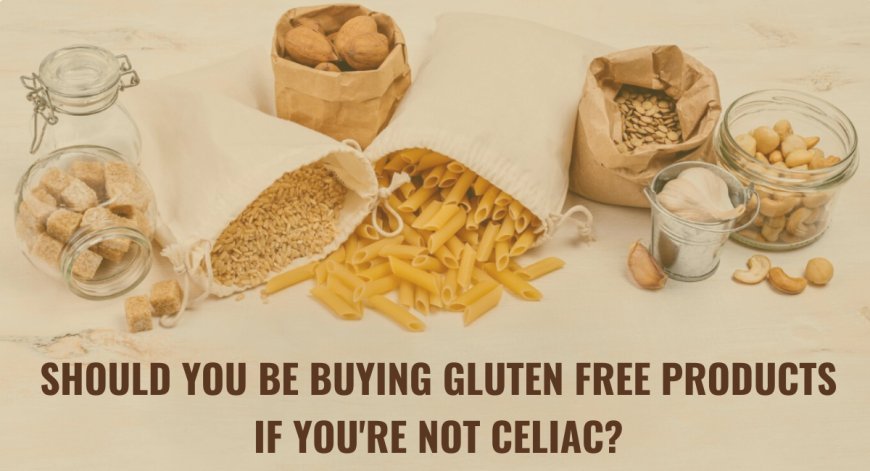Should You Be Buying Gluten Free If You're Not Celiac?

Nowadays, gluten free food products are showing up everywhere. It’s rare to find a bakery or grocery store that doesn’t offer gluten free products, right? Gluten free products are especially made for people who are gluten sensitive or suffering from celiac disease. But you may notice that many people (who can digest gluten) are also switching to a gluten free lifestyle. Maybe they think that going gluten free will help them maintain a healthy lifestyle. But is it really a good idea to go gluten free if you don’t have to? Let’s find out in this article.
Before we head on to the main thing, let’s understand what exactly gluten is:
Gluten is a protein that is found in wheat, barley, and rye. It is used in many food products to give them the desired structure and shape. For example, a bread that has a chewy texture. Similarly, other baked goods like cakes, pastries, tortillas, etc. These foods may taste good in taste, but for some people (like those suffering from celiac disease or gluten intolerance), they trigger a serious immune response that damages the small intestine. For such people, eating gluten can cause various health issues like digestive problems, fatigue, poor nutrient absorption, or even anemia.
So it’s clear that for some people, avoiding gluten is necessary. But what about the rest of us?
Why Are So Many People Going Gluten Free?
Below are some reasons why so many people are going gluten free nowadays:
Social Media Influencing: We are living in 2025, where many social media influencers are promoting brands and companies. And you might also come across some influencers promoting gluten free products. The popularity of these products is rapidly increasing, not just among those who need them but also among people who believe it’s a healthier choice. But just because it’s trending doesn’t always mean it’s the right choice for all.
Weight Loss: Some people think that staying on a gluten free diet can help them lose weight or feel less bloated. However, this can’t be true every time because many gluten free packaged foods are made with refined starches that can contribute to weight gaining. Additionally, weight loss depends on your eating habits, like how many calories you’re consuming and whether you’re exercising daily. Cutting out gluten completely from your diet cannot help you lose weight.
Curiosity: Many people are so curious about adding gluten free products to their diet. Sometimes they just want to experiment and see how their body reacts.
Note: If your body’s immune system doesn’t have a problem with gluten, it’s better to seek your doctor's advice before adding gluten free products to your diet. Because gluten can have some hidden downsides.
Do Eating Gluten Free Products Have Health Benefits?
Yes, gluten free products have some benefits that people report. Let’s take a look at them:
Less Processed Food: Fast food and baked foods are often processed, containing preservatives and artificial flavours sometimes. By going gluten free, people often cut out a lot of processed food. This naturally leads to a healthier diet filled with more fruits, vegetables, and whole foods.
Better Digestive System for Some People: Some people, especially those with gluten intolerance, notice they feel less bloated when they avoid gluten. This might not be due to gluten itself, but to the type of carbs found in wheat-based foods.
Healthier Diet Plan: When you go gluten free, you tend to focus more on eating according to a specific diet plan, and that can be a good thing. Many people who avoid gluten start focusing on what they’re eating overall. As a result, they improve their overall diet and become mindful about their food choices.
Are There Any Cons of Going Gluten Free?
Yes, going gluten free also has some drawbacks you need to be aware of before completely cutting out gluten from your diet.
Nutrient Deficiencies: Many gluten containing products have important nutrients like fibre, iron, B vitamins, and magnesium. If you cut them out, you may lose these essential nutrients and suffer from nutrient deficiency.
Not Every Gluten Free Product is Healthier: Just because the product is labelled as gluten free, it doesn’t actually become healthier. Most gluten free products are cross-contaminated, and some might contain high sugar and sodium content. Therefore, it’s important to buy only certified gluten free food products from a reliable brand.
Higher Cost: Gluten free products can be more expensive than their regular counterparts. Unless you have a medical need, there’s really no reason to pay for something you don’t need to avoid.
So—Should You Avoid Gluten?
It’s very clear—if you’re someone with gluten intolerances, weight allergy, or celiac disease, you should avoid eating gluten. But remember to talk with your doctor first so they can guide you better on what type of gluten free foods you can consume. On the other hand, if you can easily digest gluten containing foods but still want to try a gluten free diet, that’s okay too–but it’s important to do it for the right reasons. Instead, focus on making smart choices like eating more whole foods, watching your portions, and avoiding processed snacks, whether they’ve gluten or not. At the end, balance and moderation matter more than just cutting out one ingredient.
What's Your Reaction?




























































